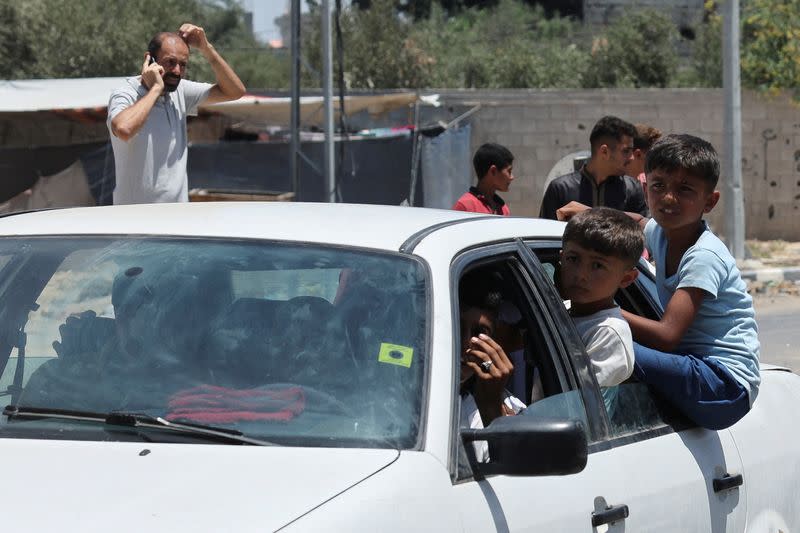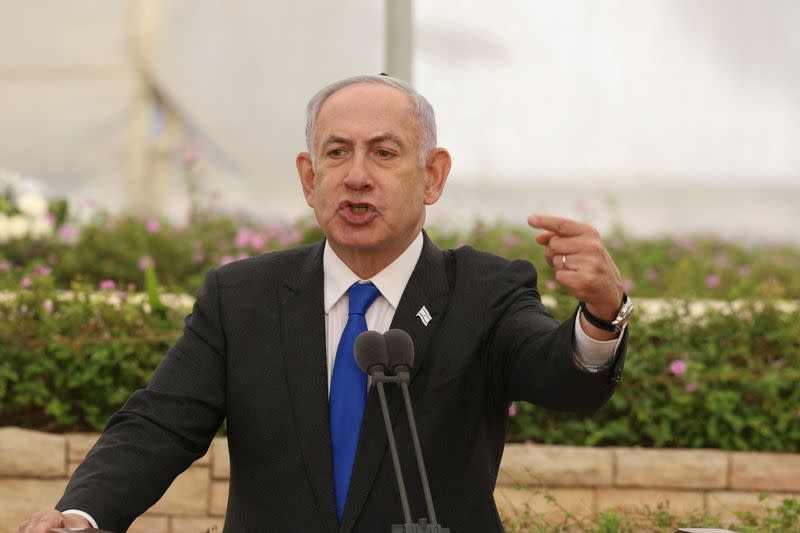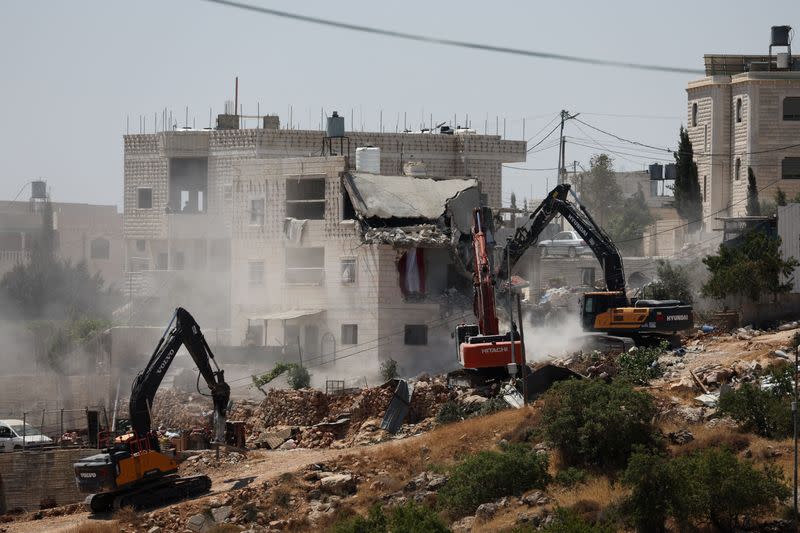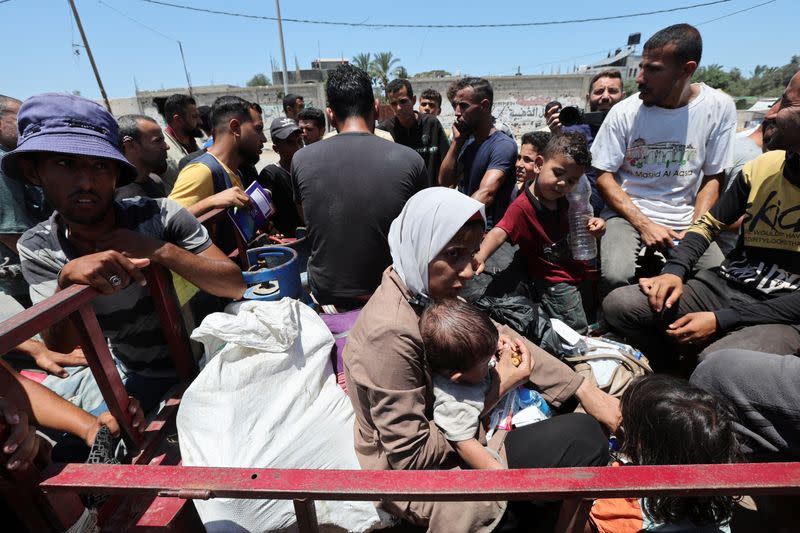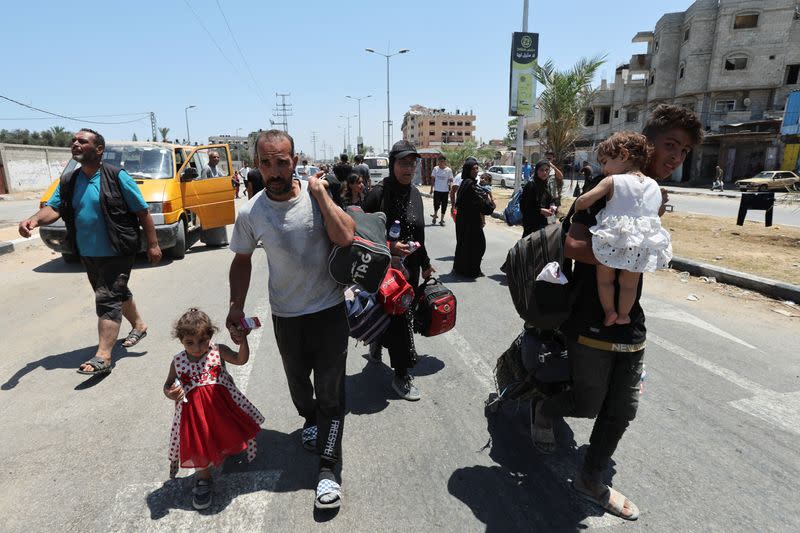Israel bombards Gaza City in one of the fiercest weeks of war, killing 26
By Nidal al-Mughrabi and Dawoud Abu Alkas
CAIRO/GAZA (Reuters) -Israel rained bombs on Gaza City during a week that residents described as comparable to the fiercest battle of the war, while a Palestinian Islamic Jihad official on Thursday said a new round of peace talks ended with no agreements yet.
Israel has been bombarding the Gaza Strip for 10 months in a war that has laid waste to the territory and killed more than 38,000 Palestinians, according to medical authorities in Gaza.
On Thursday, Israeli airstrikes killed at least six people in Gaza City and 19 in the rest of the Gaza Strip, according to Palestinian authorities. The civil emergency service said the bodies of at least 30 Palestinians killed in the previous three days also laid scattered on unreachable roads in Gaza City.
The latest round of peace talks ended with no agreements, while Israeli Prime Minister Benjamin Netanyahu accused Palestinian militant group Hamas of making demands that contradicted a framework deal brokered by Washington. Netanyahu did not say what those demands were.
In a statement, the Palestinian Islamist militant group said mediators had yet to provide it with updates on the state of the talks since it made concessions last week in response to a U.S.-backed Israeli peace offer.
Washington is pushing for a peace deal at talks in Egypt and Qatar to end the Gaza war, now in its 10th month. The head of Israel's Shin Bet intelligence agency was headed to Cairo to pursue the negotiations, Netanyahu's office said.
In Washington, White House National Security Adviser Jake Sullivan said many details still need to be hammered out to secure a deal.
In its statement on Thursday, Hamas accused Israel of "stalling to buy time to foil this round of negotiations, as it has done in previous rounds", all of which have ended in failure since a week-long truce in November.
As peace talks dragged on, Gaza City residents endured a fierce night of bombing.
Home to more than a quarter of Gaza's residents before the war, Gaza City was largely razed to the ground in late 2023, but hundreds of thousands of Palestinians have returned to homes in the ruins. Israel has once again ordered them out, though it is unclear where residents can go safely. Israel controls most of Gaza's borders.
Many say they will not leave.
"We will die but not leave to the south. We have tolerated starvation and bombs for nine months and we are ready to die as martyrs here," said Mohammad Ali, 30, reached by text message.
Ali, whose family has relocated several times within the city, said they had been running short of food, water and medicine.
"The occupation (Israel) bombs Gaza City as if the war was restarting. We hope there will be a ceasefire soon, but if not then is God's will."
The Israeli army told Gaza City residents on Wednesday to use two "safe routes" to head south. Some posted a hashtag on social media: "We are not leaving".
Asked by Reuters to comment on its operations in Gaza City, the Israeli military said in a statement its forces were working to dismantle Hamas capabilities, and that it "follows international law and takes feasible precautions to mitigate civilian harm." It said the same was not true of Hamas.
Critics have accused Israel of committing genocide against Palestinians, which Israel denies. It characterizes its actions as self-defense, though the International Court of Justice ordered Israel in January to take action to prevent acts of genocide.
Israel launched its assault on the Gaza Strip last year after Hamas-led militants stormed into southern Israel, killing 1,200 people and capturing more than 250 hostages according to Israeli tallies.
An Israeli military report on Thursday acknowledged that it had failed to protect the citizens of one of the worst hit communities, Kibbutz Be'eri, where more than 100 people were killed.
PALESTINIAN CIVILIANS CALL FOR WAR TO END
The negotiations in Qatar and Egypt follow important concessions last week from Hamas, which accepted that a truce could begin and some hostages be released without Israel first agreeing to end the war.
Just east of Gaza City in the Shejaia suburb, residents were returning on foot to a desolate moonscape of destroyed buildings after Israeli forces withdrew following a two-week offensive.
The territory's main cemetery had been bulldozed by the army. People wheeled supplies on the back of bicycles across rubble-strewn tracks, passing the remains of burnt-out and blasted Israeli armoured vehicles.
"We have returned to Shejaia after 15 days. You can see the destruction. They spared nothing, even trees, there was a lot of greenery in this area. What is the guilt of stones and trees? And what is my guilt as a civilian?" resident Hatem Tayeh told Reuters in the ruins.
"There are bodies of civilian people. What is the guilt of the civilian? Who are you fighting?"
(Reporting by Dawoud Abu Aklas in Shejaia, Gaza Strip, and Nidal al-Mughrabi in Cairo; Writing by Josie Kao; Editing by Peter Graff, Timothy Heritage, Alexandra Hudson and David Gregorio)

 Yahoo News
Yahoo News 